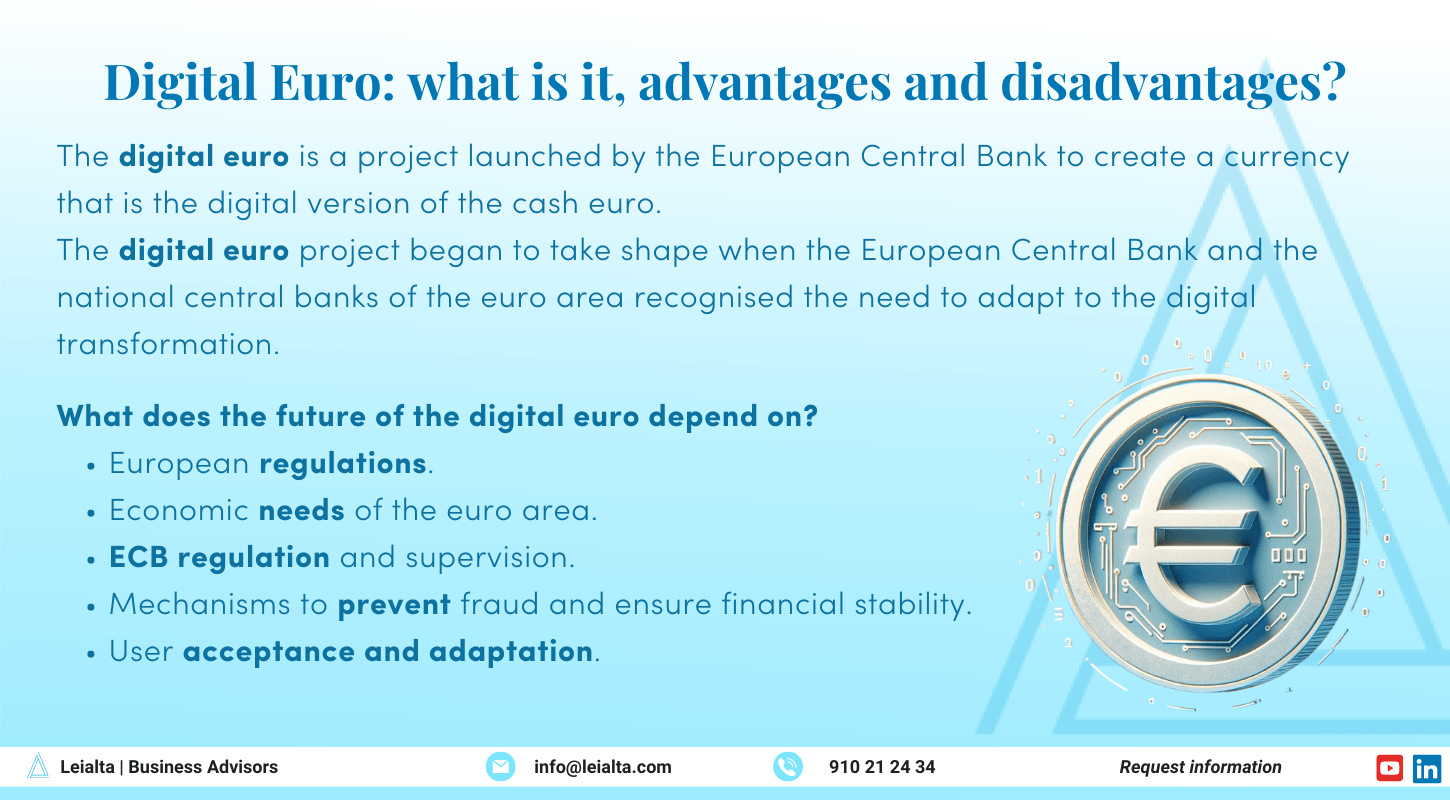
Since the coronavirus pandemic, the use of digital forms of payment has accelerated in all countries. In this context, we would like to talk about the digital euro: what it is, what advantages and disadvantages it brings and what stage it has reached in its implementation.
What is the digital euro?
Index of contents
The digital euro is a project launched by the European Central Bank to create a currency that is the digital version of the euro in cash.
This innovation responds to the increasing digitalisation of the economy and the need to offer a modern and secure alternative to cash payments.
Main differences between the digital euro and cryptocurrencies
We have all heard of cryptocurrencies such as Bitcoin, but the digital euro is different:
- It is backed by the European Central Bank, which will control its value and decide on the issuance of the new currency.
- It is regulated by banking regulations, unlike cryptocurrencies.
Origin and development of the digital euro
The digital euro project began to take shape when the European Central Bank (ECB) and the national central banks of the euro area recognised the need to adapt to the digital transformation.
The COVID-19 pandemic accelerated this process and highlighted the importance of electronic payments and the reduction of the use of cash.
Benefits of the digital euro
Its implementation brings several benefits:
1. Accessibility and efficiency
It provides a payment method that is available to all euro area citizens. Unlike cash, which can be difficult to handle, the digital euro allows for fast and secure transactions through electronic devices.
2. Security
As a European digital currency backed by the European Central Bank, the digital euro offers a higher level of security and trust than other forms of digital money not backed by any body, such as cryptocurrencies.
3. Innovation
This new currency drives innovation in the financial sector and promotes competition and the emergence of new financial services and products.
Disadvantages of the digital euro
Despite its benefits, it also has some disadvantages, such as the following:
1. Privacy
One of the main concerns regarding this new digital currency is the privacy of transactions. Although the ECB assures that privacy is a priority, the digital nature of this currency could facilitate the monitoring and tracking of individual transactions. In this way it differs from transactions with other cryptocurrencies that are completely anonymous and free.
2. Need for a technological infrastructure
The implementation of a European digital currency requires a secure technological infrastructure. This involves significant costs, as well as technical challenges that must be overcome to ensure the reliability and security of the system vis-à-vis the people using it.
3. Potential for a digital divide to emerge
There is a risk that certain populations, in particular those without access to modern technology (isolated places without internet connection) or with limited digital skills, could be excluded from using the digital euro and a digital divide could emerge.
Status of the project
The digital euro project has gone through several research phases over the past two years. In November 2023, a preparation phase started, which has two sub-phases in which the rules will be developed and tested. The current focus is on testing to see how it works.
The future of the digital euro
Several factors will determine its future:
- The rapid evolution of technology.
- The new European regulations that will emerge in this respect.
- The economic needs of the euro area.
- Regulation and supervision by the ECB and other regulatory bodies, which will have to establish a legal framework that guarantees the security, privacy and efficiency of the digital euro.
- The establishment of mechanisms to prevent fraud and ensure financial stability.
- Acceptance and adaptation by users. To achieve this, education and awareness campaigns will be needed to familiarise citizens and businesses with this new form of currency.
The digital euro will therefore represent a significant step towards the modernisation of the European financial system. Its development and adoption could transform the way we transact, increasing the efficiency, security and accessibility of payments in the euro area. However, it is crucial to address the challenges and drawbacks with caution to ensure that this innovation benefits all citizens in the region.
If you have questions about legal and commercial issues, Leialta has a team of experts who can help you solve any problems. Do not hesitate to contact us and we will help you solve any doubts you may have.



